Fleurs du Mal Magazine


Or see the index

Velimir Chlebnikov
(1885-1922)
В этот день голубых медведей…
В этот день голубых медведей,
Пробежавших по тихим ресницам,
Я провижу за синей водой
В чаше глаз приказанье проснуться.
На серебряной ложке протянутых глаз
Мне протянуто море и на нем буревестник;
И к шумящему морю, вижу, птичая Русь
Меж ресниц пролетит неизвестных.
Но моряной любес опрокинут
Чей-то парус в воде кругло-синей,
Но зато в безнадежное канут
Первый гром и путь дальше весенний.
1919
fleursdumal.nl magazine
More in: Archive C-D, Chlebnikov, Velimir
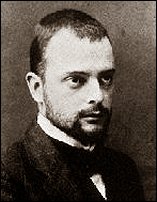
Paul Klee
(1879-1940)
Ich bin gewappnet
Ich bin gewappnet,
ich bin nicht hier,
ich bin in der Tiefe,
bin fern –
ich bin so fern –
Ich glühe bei den Toten.
Paul Klee Gedicht, 1914
fleursdumal.nl magazine
More in: Archive K-L, Expressionism, Klee, Paul
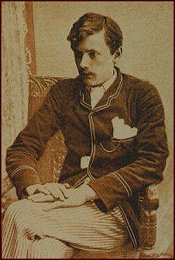
Ernest Dowson
(1867-1900)
April Love
We have walked in Love’s land a little way,
We have learnt his lesson a little while,
And shall we not part at the end of day,
With a sigh, a smile?
A little while in the shine of the sun,
We were twined together, joined lips forgot
How the shadows fall when day is done,
And when Love is not.
We have made no vows—there will none be broke,
Our love was free as the wind on the hill,
There was no word said we need wish unspoke,
We have wrought no ill.
So shall we not part at the end of day,
Who have loved and lingered a little while,
Join lips for the last time, go our way,
With a sigh, a smile.
Ernest Dowson poetry
fleursdumal.nl magazine
More in: Archive C-D, Dowson, Ernest
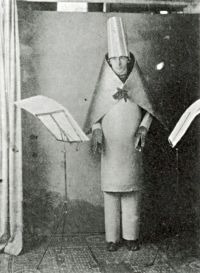 Dada Manifesto by Hugo Ball (1886–1927)
Dada Manifesto by Hugo Ball (1886–1927)
Read at the first public by Dada soirée, Zurich, July 14, 1916.
Dada is a new tendency in art. One can tell this from the fact that until now nobody knew anything about it, and tomorrow everyone in Zurich will be talking about it. Dada comes from the dictionary. It is terribly simple. In French it means “hobby horse”. In German it means “good-bye”, “Get off my back”, “Be seeing you sometime”. In Romanian: “Yes, indeed, you are right, that’s it. But of course, yes, definitely, right”. And so forth.
An International word. Just a word, and the word a movement. Very easy to understand. Quite terribly simple. To make of it an artistic tendency must mean that one is anticipating complications. Dada psychology, dada Germany cum indigestion and fog paroxysm, dada literature, dada bourgeoisie, and yourselves, honoured poets, who are always writing with words but never writing the word itself, who are always writing around the actual point. Dada world war without end, dada revolution without beginning, dada, you friends and also-poets, esteemed sirs, manufacturers, and evangelists. Dada Tzara, dada Huelsenbeck, dada m’dada, dada m’dada dada mhm, dada dera dada, dada Hue, dada Tza.
How does one achieve eternal bliss? By saying dada. How does one become famous? By saying dada. With a noble gesture and delicate propriety. Till one goes crazy. Till one loses consciousness. How can one get rid of everything that smacks of journalism, worms, everything nice and right, blinkered, moralistic, europeanised, enervated? By saying dada. Dada is the world soul, dada is the pawnshop. Dada is the world’s best lily-milk soap. Dada Mr Rubiner, dada Mr Korrodi. Dada Mr Anastasius Lilienstein. In plain language: the hospitality of the Swiss is something to be profoundly appreciated. And in questions of aesthetics the key is quality.
I shall be reading poems that are meant to dispense with conventional language, no less, and to have done with it. Dada Johann Fuchsgang Goethe. Dada Stendhal. Dada Dalai Lama, Buddha, Bible, and Nietzsche. Dada m’dada. Dada mhm dada da. It’s a question of connections, and of loosening them up a bit to start with. I don’t want words that other people have invented. All the words are other people’s inventions. I want my own stuff, my own rhythm, and vowels and consonants too, matching the rhythm and all my own. If this pulsation is seven yards long, I want words for it that are seven yards long. Mr Schulz’s words are only two and a half centimetres long.
It will serve to show how articulated language comes into being. I let the vowels fool around. I let the vowels quite simply occur, as a cat meows . . . Words emerge, shoulders of words, legs, arms, hands of words. Au, oi, uh. One shouldn’t let too many words out. A line of poetry is a chance to get rid of all the filth that clings to this accursed language, as if put there by stockbrokers’ hands, hands worn smooth by coins. I want the word where it ends and begins. Dada is the heart of words.
Each thing has its word, but the word has become a thing by itself. Why shouldn’t I find it? Why can’t a tree be called Pluplusch, and Pluplubasch when it has been raining? The word, the word, the word outside your domain, your stuffiness, this laughable impotence, your stupendous smugness, outside all the parrotry of your self-evident limitedness. The word, gentlemen, is a public concern of the first importance.
Dada Manifesto by Hugo Ball (1886–1927)
Dada soirée, Zurich, July 14, 1916.
fleursdumal.nl magazine
More in: Archive A-B, Ball, Hugo, DADA, Dada

Jonathan Swift
(1667–1745)
On The World
With a whirl of thoughts oppress’d,
I sunk from reverie to rest.
A horrid vision seized my head,
I saw the graves give up their dead!
Jove, arm’d with terrors, bursts the skies,
And thunder roars and lightning flies!
Amazed, confused, its fate unknown,
The world stands trembling at his throne!
While each pale sinner hung his head,
Jove, nodding, shook the heavens, and said:
“Offending race of human kind,
By nature, reason, learning, blind;
You who, through frailty, stepp’d aside;
And you, who never fell from pride:
You who in different sects were shamm’d,
And come to see each other damn’d;
(So some folk told you, but they knew
No more of Jove’s designs than you;)
—The world’s mad business now is o’er,
And I resent these pranks no more.
—I to such blockheads set my wit!
I damn such fools!—Go, go, you’re bit.”
Jonathan Swift poetry
fleursdumal.nl magazine
More in: Archive S-T, Swift, Jonathan
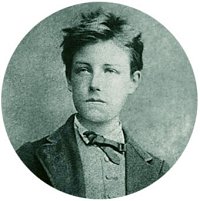
Arthur Rimbaud
(1854-1891)
Chant de guerre parisien
Le Printemps est évident, car
Du cœur des Propriétés vertes,
Le vol de Thiers et de Picard
Tient ses splendeurs grandes ouvertes !
Ô Mai ! quels délirants culs-nus !
Sèvres, Meudon, Bagneux, Asnières,
Écoutez donc les bienvenus
Semer les choses printanières !
Ils ont schako, sabre et tam-tam,
Non la vieille boîte à bougies
Et des yoles qui n’ont jam, jam…
Fendent le lac aux eaux rougies !
Plus que jamais nous bambochons
Quand arrivent sur nos tanières
Crouler les jaunes cabochons
Dans des aubes particulières !
Thiers et Picard sont des Éros,
Des enleveurs d’héliotropes,
Au pétrole ils font des Corots :
Voici hannetonner leurs tropes….
Ils sont familiers du Grand Truc !..
Et couché dans les glaïeuls, Favre
Fait son cillement aqueduc,
Et ses reniflements à poivre !
La Grand’ville a le pavé chaud,
Malgré vos douches de pétrole,
Et décidément, il nous faut
Vous secouer dans votre rôle…
Et les Ruraux qui se prélassent
Dans de longs accroupissements,
Entendront des rameaux qui cassent
Parmi les rouges froissements !
Arthur Rimbaud poetry
fleursdumal.nl magazine
More in: Archive Q-R, Arthur Rimbaud, Rimbaud, Arthur, Rimbaud, Arthur
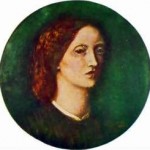
Elizabeth (Lizzie) Siddal
(1829-1862)
At Last
O mother, open the window wide
And let the daylight in;
The hills grow darker to my sight
And thoughts begin to swim.
And mother dear, take my young son,
(Since I was born of thee)
And care for all his little ways
And nurse him on thy knee.
And mother, wash my pale pale hands
And then bind up my feet;
My body may no longer rest
Out of its winding sheet.
And mother dear, take a sapling twig
And green grass newly mown,
And lay them on my empty bed
That my sorrow be not known.
And mother, find three berries red
And pluck them from the stalk,
And burn them at the first cockcrow
That my spirit may not walk.
And mother dear, break a willow wand,
And if the sap be even,
Then save it for sweet Robert’s sake
And he’ ll know my sou’s in heaven.
And mother, when the big tears fall,
(And fall, God knows, they may)
Tell him I died of my great love
And my dying heart was gay.
And mother dear, when the sun has set
And the pale kirk grass waves,
Then carry me through the dim twilight
And hide me among the graves.
Elizabeth (Lizzie) Siddal poems
fleursdumal.nl magazine
More in: Archive S-T, Lizzy Siddal, Siddal, Lizzy
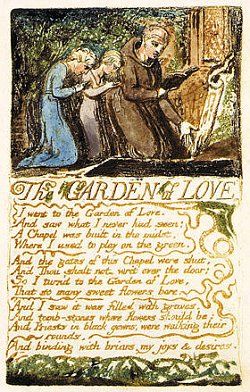
William Blake
(1757-1827)
The Garden Of Love
I went to the Garden of Love,
And saw what I never had seen:
A Chapel was built in the midst,
Where I used to play on the green.
And the gates of the Chapel were shut,
And Thou shalt not writ over the door;
So I turn’d to the Garden of Love
That so many sweet flowers bore,
And I saw it was filled with graves,
And tomb-stones where flowers should be:
And Priests in black gowns were walking their rounds,
And binding with briars my joys & desires.
William Blake poetry
fleursdumal.nl magazine
More in: Archive A-B, Blake, William

Elizabeth Barrett Browning
(1806-1861)
If Thou Must Love Me
If thou must love me, let it be for naught
Except for love’s sake only. Do not say
“I love her for her smile…her look…her way
Of speaking gently…for a trick of thought
That falls in well with mine, and certes brought
A sense of pleasant ease on such a day” –
For these things in themselves, Belovéd, may
Be changed, or change for thee, – and love, so wrought,
May be unwrought so. Neither love me for
Thine own dear pity’s wiping my cheeks dry, –
A creature might forget to weep, who bore
Thy comfort long, and lose thy love thereby!
But love me for love’s sake, that evermore
Thou mayst love on, through love’s eternity.
Elizabeth Barrett Browning poetry
fleursdumal.nl magazine
More in: Archive A-B, Barrett Browning, Elizabeth

Hendrik Marsman
(1899-1940)
De vrouw van de zon
‘Ik zag een vrouw, die schreed
alsof zij nooit zou sterven.’
A. Roland Holst
Vrij en eeuwig,
tijdeloos ontheven,
in een hoog en onaanrandbaar zweven,
schrijdt gij,
koninklijk geheven,
langs de blauwe muren van het licht.
o! de sneeuwstorm van uw gouden mantel
o! de zon, het diamanten vlamsel,
dat de heemlen uitstroomt uwer haren
langs de wolkenloze bergen van de dag
o! de nacht –
waar uw fonkelende gouden tocht
in de hoge, sidderende loop der herten
eenzaam eindigt,
in de diepste verten.
Hendrik Marsman poetry
fleursdumal.nl magazine
More in: Archive M-N, Marsman, Hendrik

Andrew Marvel
(1621-1678)
To His Coy Mistress
Had we but World enough, and Time,
This coyness Lady were no crime.
We would sit down, and think which way
To walk, and pass our long Loves Day.
Thou by the Indian Ganges side
Should’st Rubies find: I by the tide
Of Humber would complain. I would
Love you ten years before the Flood:
And you should if you please refuse
Till the conversion of the Jews.
My vegetable love should grow
Vaster than Empires, and more slow.
An hundred years should grow to praise
Thine Eyes, and on thy Forehead Gaze.
Two hundred to adore each Breast:
But thirty thousand to the rest.
An Age at least to every part,
And the last Age should show your Heart.
For Lady you deserve this State;
Nor would I love at lower rate.
But at my back I alwaies hear
Times winged Charriot hurrying near:
And yonder all before us lye
Desarts of vast Eternity.
Thy Beauty shall no more be found;
Nor, in thy marble Vault, shall sound
My echoing Song: then Worms shall try
That long preserv’d Virginity:
And you quaint Honour turns to dust;
And into ashes all my Lust.
The grave’s a fine and private place,
But none I think do there embrace.
Now therefore, while the youthful hew
Sits on thy skin like morning [dew],
And while thy willing Soul transpires
At every pore with instant Fires,
Now let us sport us while we may;
And now, like am’rous birds of prey,
Rather at once our Time devour,
Than languish in his slow-chapt pow’r.
Let us roll all our Strength, and all
Our sweetness, up into one Ball:
And tear our Pleasures with rough strife,
Through the Iron gates of Life.
Thus, though we cannot make our Sun
Stand still, yet we will make him run.
Andrew Marvel poetry
fleursdumal.nl magazine
More in: Archive M-N, CLASSIC POETRY

Paul Klee
(1879-1940)
Was scherimi ummi
Was scherimi ummi
I bi so guet wini
Der Kerli der i bi
kani nolang werde.
Spruchgedicht von Paul Klee, 1923
fleursdumal.nl magazine
More in: Archive K-L, Expressionism, Klee, Paul
Thank you for reading Fleurs du Mal - magazine for art & literature